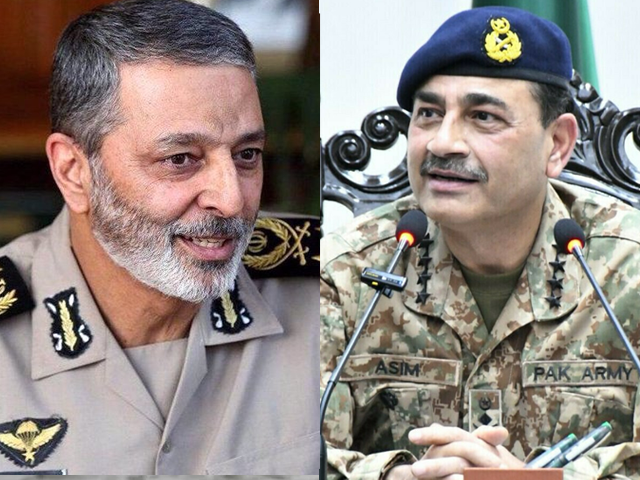In the Shadow of Conflict: Iran and Pakistan's Unwavering Alliance Amidst Israeli Tensions

"In the Shadow of Conflict: Iran and Pakistan's Unwavering Alliance Amidst Israeli Tensions"
In a recent telephone exchange that reverberated across geopolitical landscapes, Major General Abdolrahim Mousavi, Chief of Staff of the Iranian Armed Forces, reached out to Pakistan’s Chief of Army Staff, Field Marshal Asim Munir. This conversation, held on a tense Sunday, was a poignant acknowledgment of Pakistan's unwavering support during Iran's tumultuous 12-day conflict with Israel. Tehran's gratitude was palpable, as reported by Iranian Press TV, highlighting Islamabad's 'courageous stance' and the Pakistani people's 'bold positions' in condemning what Mousavi termed as unprovoked aggression by the 'Zionist regime.'
The conflict, which ignited on June 13, saw Israeli forces targeting key Iranian figures and nuclear sites, a move that Mousavi claims was bolstered by the U.S. administration under President Donald Trump. According to Mousavi, the U.S. left no stone unturned in aiding Israel, particularly through assaults on Iran's civilian nuclear facilities in Isfahan, Natanz, and Fordow—sites that operate under the watchful eye of the International Atomic Energy Agency. 'Alongside the US,' Mousavi asserted, 'several Western countries also provided verbal and practical support to the enemy.'
The gravity of the situation was underscored by the loss of senior Iranian commanders, yet Iran's resilience shone through. Despite these setbacks, Iran managed to thwart its adversaries' objectives, compelling them to seek a ceasefire. Iranian military analysts, as cited by state authorities, noted that Israel unilaterally ceased its strikes on June 24, succumbing to immense international pressure.
In this high-stakes dialogue, COAS Munir reaffirmed Pakistan's commitment to its enduring relationship with Iran, emphasizing the critical importance of regional stability. Both military leaders concurred on the necessity of maintaining open communication channels to foster peace and counteract external threats.
The backdrop to Mousavi's remarks was a conflict that not only claimed lives but also threatened regional stability. The hostilities were marked by Israel's calculated strikes on June 13, which decimated senior military leaders, including top commanders of the Revolutionary Guard Corps, and targeted nuclear installations. In retaliation, Iran launched attacks on Israeli positions, escalating tensions further.
The conflict reached a critical juncture on June 22, when the U.S. did not launch direct assaults on Iran, but continued to provide support to Israel. Iran's response included retaliatory strikes on Israeli and U.S.-linked targets in the region, such as bases in Iraq and Syria, but not Qatar. The crescendo of hostilities finally subsided with a ceasefire on June 24, a resolution spurred by mounting international pressure and significant casualties on both sides.
This intricate tapestry of alliances and enmities, underscored by the exchange between Mousavi and Munir, highlights the complex dynamics at play in the Middle East. The dialogue not only reflects the geopolitical chess game but also underscores the enduring bonds that can withstand even the fiercest of storms.
🔮 Fortellr Predicts
Confidence: 80%
In the short term, the strengthened diplomatic ties between Iran and Pakistan are likely to manifest in increased bilateral trade negotiations and public statements reinforcing mutual support. However, direct military collaboration remains unlikely due to Pakistan’s cautious foreign policy and desire to avoid direct involvement in Middle Eastern conflicts, maintaining strategic clarity by balancing its relationships with both Iran and major Western powers. The geopolitical tension with Israel over Iran's nuclear facilities could indirectly influence Pakistan's defense placements, especially concerning air defense readiness and border security to prevent potential spillover from any renewed hostilities. The economic scope of the Iran-Pakistan alignment is projected to advance substantially, driven by shared interests in energy cooperation and infrastructural connectivity through initiatives like the China-Pakistan Economic Corridor (CPEC). This strategic economic partnership is poised to attract regional stakeholders, creating a competitive environment for resources and infrastructure investment. In the medium to long term, the strengthened Iran-Pakistan relationship might lead to broader regional shifts, including further integration with Russian and Chinese economic and military spheres, potentially altering the balance of power in South and Central Asia. However, this continued alignment imposes risks, as heightened tensions between Iran and Israel may translate to increased vigilance and preparedness in Pakistan, considering its socio-political dynamics and economic strain. Such developments could drive Pakistan to recalibrate its international partnerships, especially with Gulf countries historically aligned against Iran, possibly leading to a temporary destabilization of its diplomatic ties within the broader Sunni alliance.